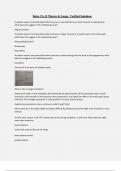Exam (elaborations)
Bates Ch 15 Thorax & Lungs Verified Solutions
- Institution
- Bates Ch 15 Thorax & Lungs Verified Solutions
Bates Ch 15 Thorax & Lungs Verified Solutions A patient reports chest pain/discomfort and uses a clenched fist over their sternum to indicate this; what does this suggest is the underlying cause? Angina pectoris A patient reports chest pain/discomfort and uses a finger to point to a tender...
[Show more]



